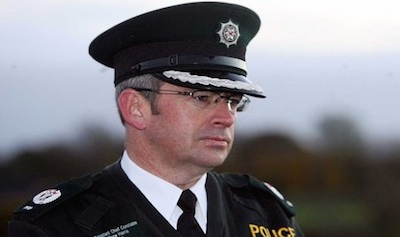
Top secret files relating to the killing of nine men in County Armagh more than 30 years ago were destroyed just weeks before an inquest into the deaths was due to begin, it has emerged. Other files are still being edited for ‘sensitive’ information by former members of the murderous RUC Special Branch.
In the mid 1980s two senior British police detectives, John Stalker and Colin Sampson, were each asked to investigate a series of incidents which resulted in the killing of six unarmed nationalists.
Gervaise McKerr, Sean Burns, Eugene Toman, Seamus Grew, Roddy Carroll and 17 year-old Michael Tighe were all shot dead by the RUC in a series of controversial shootings in County Armagh.
All but Michael Tighe were members of Irish republican armed forces; however none were armed at the time they were killed. The incidents became known as the ‘Shoot to Kill’ deaths after one of the RUC men involved admitted that official claims that the men had been killed after driving through Crown force checkpoints were false.
In 1984 then Greater Manchester Deputy Chief Constable John Stalker began to investigate the killings. Weeks before he was due to publish his report in 1986 he was removed from the investigation and replaced by Colin Sampson.
Despite a 30 year campaign by the families of those killed for an inquest into the deaths, the Stalker/Sampson reports have never been made public.
The files compiled by Stalker and Sampson are understood to be crucial to the inquest’s ability to investigate the events surrounding the killings.
The North’s Senior Coroner John Leckey had hoped to open an inquest into the deaths in April 2013.
However official government correspondence has confirmed that Stalker/Sampson files were destroyed last February, just weeks before the inquest was due to open.
The Coroners’ Office was not informed until July of this year that the files had been destroyed.
The correspondence does not make it clear how many files relating to Stalker/Sampson were destroyed or which government departments, which include the Ministry of Defence and MI5, may have been responsible for the destruction of the files.
News that Stalker/Sampson files have been destroyed came as newly appointed Deputy Chief Constable Drew Harris, pictured above, appeared before Senior Coroner John Leckey on Monday to explain the PSNI delays in disclosing relevant intelligence material to the court.
Mr Leckey has previously warned that the inquests may not be able to proceed if there is insufficient disclosure of state files.
Harris told the court the failure to deliver the requested files was “a matter of regret”.
The Senior Coroner warned that a continuing failure to adequately resource inquests into historic conflict killings could leave Britain in breach of international law.
It is understood more than 80 boxes of classified information are still being held at a PSNI facility in Seapark, Carrickfergus, County Antrim.
The Coroner’s court heard how three former RUC special branch police have been carrying out a vetting and ‘redaction’ process on the secret files. Details of the process remain unknown.
Harris, himself a former RUC chief, rejected claims there could be a conflict of interest. “They themselves (the RUC Special Branchmen) are not decision makers. They are gatekeepers,” he said.
Harris was only appointed to his post earlier this month, less than 24 hours after Sinn Fein walked out of the recruitment process, complaining that it had been “compromised”.
Sinn Fein Assembly member Raymond McCartney said the destruction of the secret files was an attempt to block justice. He said it was “shocking but sadly not surprising”.
“Over several decades the British state has gone to great lengths to cover up its role in the conflict and this is yet another example of that,” he said.
“While it is unclear whether it was the Ministry of Defence, MI5 or another agency who ordered the destruction of these files, it highlights the lengths to which the British government will go to cover up the truth.
“It should be remembered that at the heart of this there are families who are being denied the truth about what happened to their loved ones.
“The British government is clearly denying the families of those killed in these incidents their basic human rights by blocking access to the truth.
“It also exposes the lie that the British government was not a protagonist in the conflict. All of this highlights the need to for an appropriate method of dealing with the past.”
![[Irish Republican News]](https://republican-news.org/graphics/title_gifs/rn.gif)
![[Irish Republican News]](https://republican-news.org/graphics/title_gifs/harp.gif)

